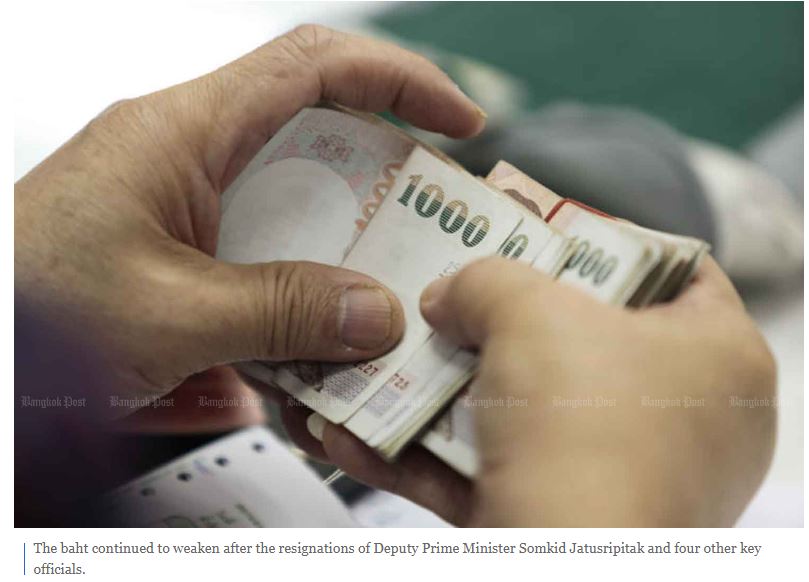Thailand: Baht erodes further after Somkid’s exit
The baht continued to weaken on Thursday after the resignations of Deputy Prime Minister Somkid Jatusripitak and four other key officials, reflecting foreign investors’ concerns about the continuity of the government’s economic policies.
The baht is now Asia’s weakest currency against the US dollar on a year-to-date basis, down 5.5%, according to Reuters.
The local currency’s value fell to 31.69 per US dollar as of 6.54pm on Thursday from 31.56 on Wednesday. The baht touched 31.76 at one point on Thursday.
The latest development is in stark contrast with last year’s currency movements. The baht emerged as Asia’s top-performing currency in 2019, eclipsing the 30-baht-per-dollar mark before the New Year, driven by the country’s large current account surplus and ample foreign reserves.
For the first five months of the year, net foreign outflow from the Thai bond market stood at 150 billion baht. But the market booked net foreign capital inflows worth 30 billion baht in June and a further 10 billion baht in July.
This movement reflects the improved confidence of offshore investors, mainly due to the government managing to contain the coronavirus outbreak.
But Thailand’s stock market has seen net foreign outflow worth 221.6 billion baht year-to-date.
Mr Somkid and the others tendered their resignations on Wednesday after mounting pressure from the Palang Pracharath Party (PPRP) amid a leadership reshuffle.
The resignations will clear the way for a cabinet shake-up demanded by the PPRP after supporters of Deputy Prime Minister Prawit Wongsuwon pushed for him to become the new party leader last month, replacing Finance Minister Uttama Savanayana.
The reshuffle of the government’s economic team has caused jitters among foreign investors, who are concerned about continuity in the government’s policies — especially with regard to the Eastern Economic Corridor, a special economic development zone of three provinces in eastern Thailand, said Tim Leelahaphan, an economist at Standard Chartered Bank Thai.
“The names of [potential candidates] of the new economic team do not matter much, as the government needs to set up a new cabinet rapidly and continue existing economic policies,” Mr Tim said. “The government has contained the outbreak and implemented financial relief measures quite well for the past several months. Such direction needs to continue to maintain a positive economic recovery momentum.”
The Bank of Thailand’s Monetary Policy Committee (MPC) is poised to cut the policy interest rate by 25 basis points next month from the current all-time low of 0.50%, he said.
Monetary policy will be a key role supporting economic momentum during formation of the government’s new economic team, which will take time for new cabinet ministers to be appointed, Mr Tim said.
The MPC stands ready to cut its policy rate in the event that a second-wave outbreak of coronavirus occurs on a large scale, said Don Nakornthab, senior director of the central bank’s economic and policy department.
His comments echoed deputy governor Mathee Supapongse’s recent remarks about how the central bank has not shut the door to further monetary policy easing.
The Bank of Thailand paused its benchmark rate at 0.50% in June to preserve policy space amid heightened economic headwinds after cutting the key rate three times this year by 25 basis points each.
If the second wave of the outbreak has a significant impact on global economic activity and affects Thailand’s economic recovery momentum, the central bank is prepared for further monetary easing, Mr Don said.
Such a risk, however, could originate externally rather than internally, he said.
In Thailand, there is lesser opportunity for a second-wave outbreak to occur, he said, as the government has managed to contain domestic-based infections to a lower number compared with cases in other countries.
And while Thailand may not be able to evade a second wave, it could occur on a smaller scale, Mr Don said.
Under the central bank’s scenario, the public health system can manage new cases of infection if the total is 20-30 cases a day.
“We should not stick with [continuous] zero domestic infection,” Mr Don said. “Maintaining this record is quite difficult when we don’t have any vaccine yet.”
Source: https://www.bangkokpost.com/business/1952700/baht-erodes-further-after-somkids-exit


 Thailand
Thailand




